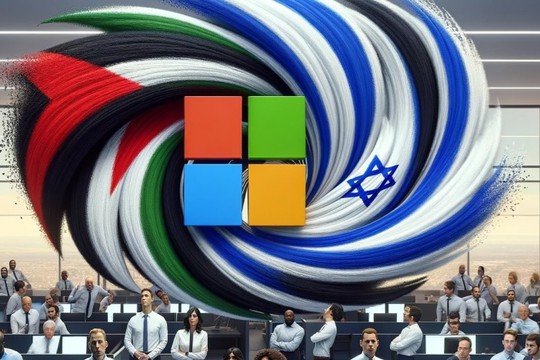Pic.: ydh.com.tr
The Israeli military undertook an ambitious project to store a giant trove of Palestinians’ phone calls on Microsoft’s servers in Europe, ‘The Guardian’ reveals this secret.
One afternoon in late 2021, Microsoft’s chief executive, Satya Nadella, met with the commander of Israel’s military surveillance agency, Unit 8200. The spymaster, Yossi Sariel, won Nadella’s support for a plan that would grant Unit 8200 access to a customised and segregated area within Microsoft’s Azure cloud platform.
Armed with Azure’s near-limitless storage capacity, Unit 8200 began building a powerful new mass surveillance tool: a sweeping and intrusive system that collects and stores recordings of millions of mobile phone calls made each day by Palestinians in Gaza and the West Bank.
Revealed here for the first time in an investigation by the Guardian with the Israeli-Palestinian publication +972 Magazine and Hebrew-language outlet Local Call, the cloud-based system – which first became operational in 2022 – enables Unit 8200 to store a giant trove of calls daily for extended periods of time.
Microsoft claims Nadella was unaware of what kind of data Unit 8200 planned to store in Azure. But a cache of leaked Microsoft documents and interviews with 11 sources from the company and Israeli military intelligence reveals how Azure has been used by Unit 8200 to store this expansive archive of everyday Palestinian communications.
“Israeli war crimes are powered by Azure”
According to three Unit 8200 sources, the cloud-based storage platform has facilitated the preparation of deadly airstrikes and has shaped military operations in Gaza and the West Bank.
Thanks to the control it exerts over Palestinian telecommunications infrastructure, Israel has long intercepted phone calls in the occupied territories. But the indiscriminate new system allows intelligence officers to play back the content of cellular calls made by Palestinians, capturing the conversations of a much larger pool of ordinary civilians.
Intelligence sources with knowledge of the project said Unit 8200’s leadership turned to Microsoft after concluding it did not have sufficient storage space or computing power on the military’s servers to bear the weight of an entire population’s phone calls.
Several intelligence officers from the unit, which is comparable to the US National Security Agency (NSA) in its surveillance capabilities, said that a mantra emerged internally that captured the project’s scale and ambition: “A million calls an hour”.
Disclosures about the role of Microsoft’s Azure platform in the surveillance project come as the US tech giant faces pressure from employees and investors over its ties to Israel’s military and the role its technology has played in the 22-month offensive in Gaza.
In May, an employee disrupted a keynote speech by Nadella in an act of protest, at one point yelling: “How about you show how Israeli war crimes are powered by Azure?”
Unit 8200 sources said intelligence drawn from the enormous repositories of phone calls held in Azure had been used to research and identify bombing targets in Gaza. One of the sources said that when planning an airstrike on an individual located within densely populated areas where high numbers of civilians are present, officers would use the cloud-based system to examine calls made by people in the immediate vicinity.
The information stored in Azure amounted to a rich repository of intelligence about Palestinians to blackmail people, place them in detention
The sources also said use of the system had increased during the campaign in Gaza, which has killed more than 60,000 people in the territory, the majority of whom are civilians, including over 18,000 children.
But the initial focus of the system was the West Bank, where an estimated 3 million Palestinians live under Israeli military occupation. Unit 8200 sources said the information stored in Azure amounted to a rich repository of intelligence about its population that some in the unit claimed had been used to blackmail people, place them in detention, or even justify their killing after the fact.
“When they need to arrest someone and there isn’t a good enough reason to do so, that’s where they find the excuse,” one said, referring to the information stored in the cloud.
A Microsoft spokesperson said it had “no information” about the kind of data stored by Unit 8200 in its cloud. They said the company’s “engagement with Unit 8200 has been based on strengthening cybersecurity and protecting Israel from nation state and terrorist cyber-attacks”.
Among Microsoft staff, the project was shrouded in considerable secrecy and engineers were told not to mention Unit 8200 by name. Under the plan, vast troves of raw intelligence material would sit in Microsoft’s datacentres overseas.
Files suggest that by July this year, 11,500 terabytes of Israeli military data – equivalent to approximately 200m hours of audio – was held in Microsoft’s Azure servers in the Netherlands, while a smaller proportion was stored in Ireland.
Several of the sources insisted the cloud-based system had prevented deadly attacks against Israelis. But it notably failed to prevent the Hamas-led attacks of 7 October 2023 in which nearly 1,200 people were killed in southern Israel and 240 people were kidnapped.
…According to some reports, the Israeli leadership was aware of the preparations for the October 7 attack, but Netanyahu benefited from this escalation for political reasons. Therefore, wiretapping in Gaza was not used to prevent the Hamas attack.
read more in our Telegram-channel https://t.me/The_International_Affairs

 10:34 04.11.2025 •
10:34 04.11.2025 •























